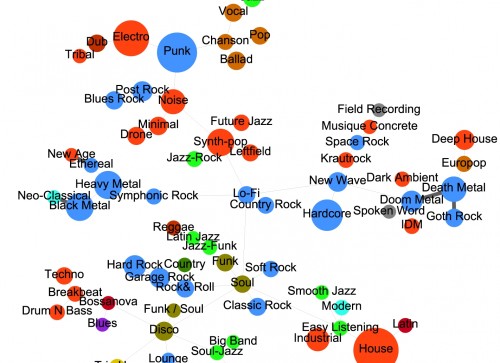Tag archives: musicology
The physics of pop music, a stroll around the LHC, 3D illuminations in Bath and more

Pop physics: some of the subgenres used in a study of pop music. (Courtesy: Gamaliel Percino, Peter Klimek and Stefan Thurner/PLOS ONE 10.1371/journal.pone.0115255)
By Hamish Johnston
The take-home message from this week’s Red Folder is that “Scientists just discovered why all pop music sounds exactly the same”, at least according to an article on Music.Mic. The report describes a paper published in PLOS ONE by Stefan Thurner – a physicist at the Santa Fe Institute – and colleagues at the Medical University of Vienna.
The researchers used the online music database Discogs to sort the material on 500,000 albums into 15 musical genres and 374 subgenres. You can see examples of some of the subgenres in the above image. They discovered that as a genre of music becomes more popular, it becomes less complex as all its constituent artists and songs start sounding the same. Music.Mic’s Tom Barnes explains in his article how this ties in with various trends in the music industry, where he says “uniformity sells”.
View all posts by this author | View this author's profile
What makes the perfect song?
By James Dacey
There was a telling moment early on at the event I attended last night when science writer Philip Ball was asked to name his “perfect song”. With a slightly bemused look, Ball picked a tune that I’m pretty sure few in the audience had heard of – “The Most Wanted Song”, which was co-written by a neuroscientist to incorporate the musical elements that people find most pleasing to the ear. Give the tune a listen and you’ll realise that it is a horrible saccharine track that you’ll quickly want to turn off. Of course, the point of the song – and Ball’s choice – was to ridicule the idea that you can create beautiful music with a formula.
Ball was part of a panel discussion at the Royal Opera House in London on “What makes the perfect song?”. He was joined by physicist-turned-opera singer Christine Rice and musicologist Maria Witek, and the event was chaired by the physicist, broadcaster and former pop star Brian Cox (by angela). While the panellists were unanimous in their belief that music is a complex emotional thing that cannot be fully explained by physics, they did have some fascinating insights into the science of song.
View all posts by this author | View this author's profile
